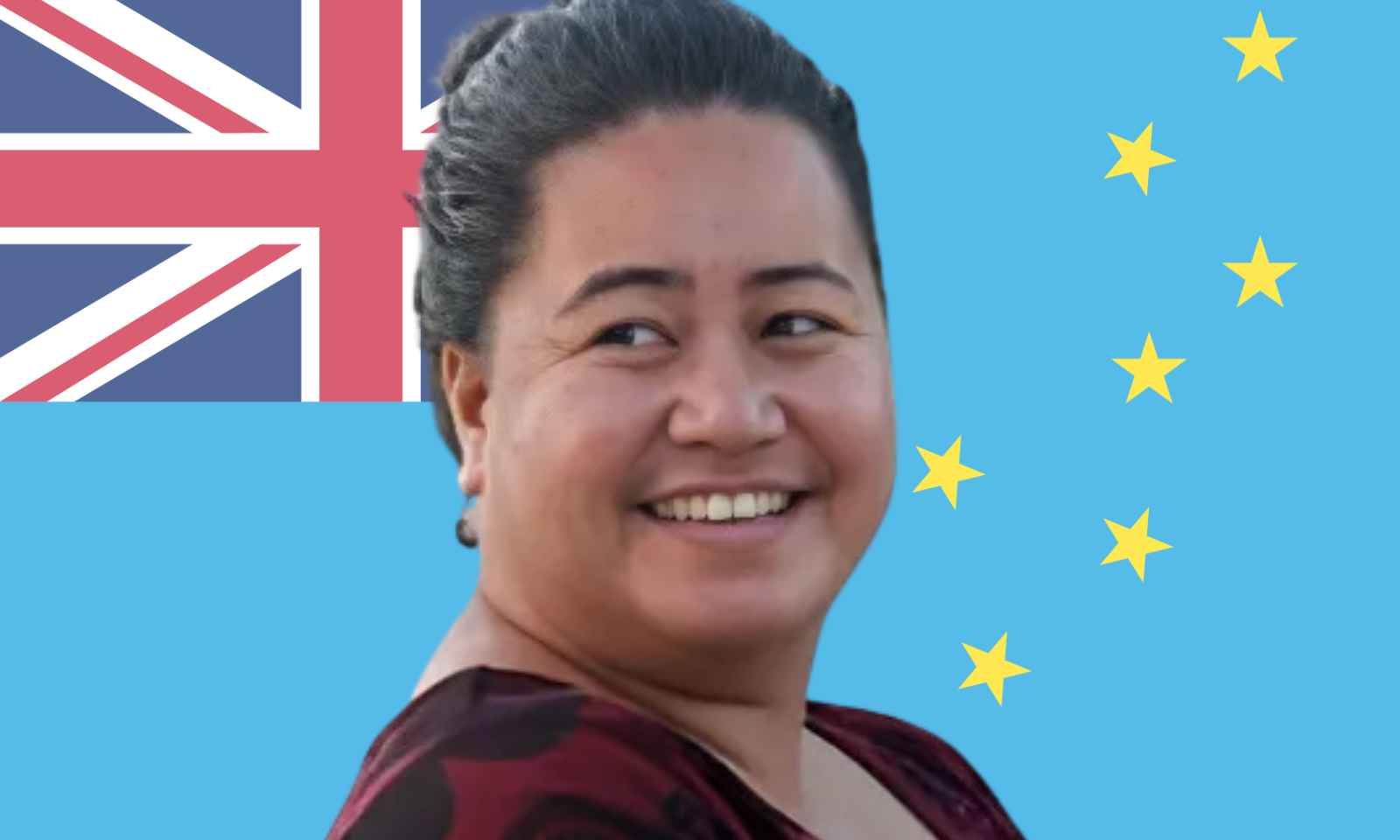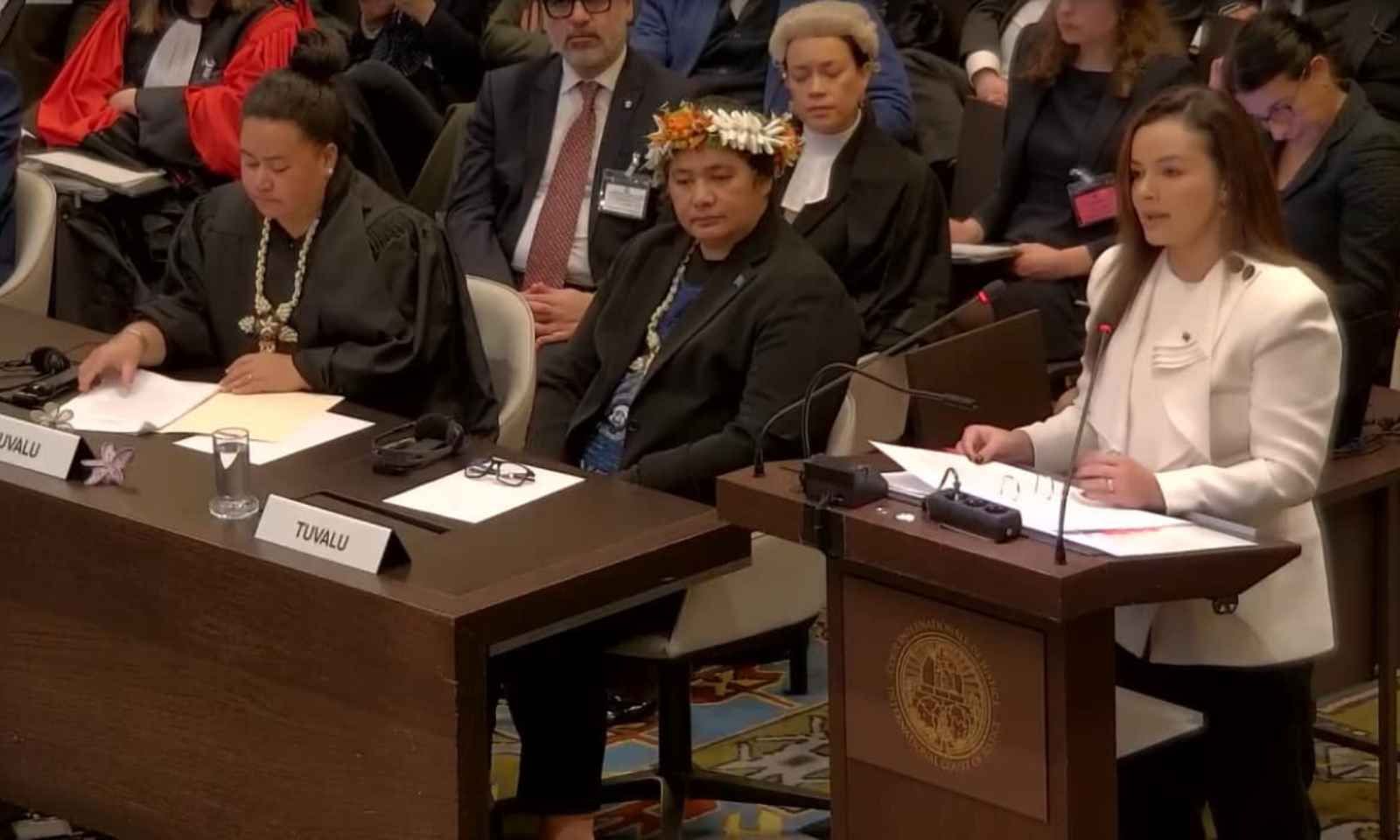

Tuvalu’s High Commissioner to Fiji, Dr Eselealofa Apinelu.
Photo/UN WEB TV
Climate change: Pacific nations unite to hold big emitters accountable
Tuvalu has joined Vanuatu at the World Court to appeal for responsibility from the larger countries.


Waitangi in Pictures: Waka, whānau and manu under the bridge

Councillor warns Māori voices must be ‘normal’ as wards disappear



Waitangi in Pictures: Waka, whānau and manu under the bridge

Councillor warns Māori voices must be ‘normal’ as wards disappear

Tuvalu has made its case at the International Court of Justice (ICJ), where a delegation sought an advisory opinion to clarify the legal obligations of states in combating climate change, a matter initiated by Vanuatu.
Tuvalu’s High Commissioner to Fiji, Dr Eselealofa Apinelu, represented the Pacific island nation’s delegation at this session in the Hague, Netherlands, last Friday.
Tuvalu’s appearance at the ICJ highlighted the existential threats facing its 10,000 residents, who are witnessing their livelihoods, homes, and cultural heritage being compromised by rising seas.
Apinelu touched on the significance of whenua (land) and its cultural and spiritual importance.
Human face of climate change
“Whenua calls us all Tuvaluans, as indigenous people, towards the deepest respect for the land, natural world, and its greater laws for which none of us escapes," Apinelu said.
“Climate change endangers the very core of whenua.
“Sea level rise is an omnipresent threat, and in fact, while we gather here today in this Peace Palace, Tuvalu, my country and my home, is expected to be the first country to be completely lost to climate-related sea level rise.”
Watch the Tuvalu delegation's presentation at the ICJ.
To illustrate their point, the delegation used a state-of-the-art 3D model created by Tuvaluan oceanographers, showing how rising seas will submerge Tuvalu’s capital, the island of Funafuti.
Even a rise of just 34 centimetres in sea levels has transformed minor flooding events into catastrophic disasters, overwhelming the coral atolls on which Tuvaluans depend.
But the loss is not only geographical. Testimonies from Tuvaluans reveal the real challenges they face.
Lina Peleti, a government employee, shared how the changes have impacted her home.
“Sooner or later, we won't have any more space because already the sea is coming into our house, coming under our house.
“So, everybody's trying to move out now from our house. It's not like home.”

Young Tuvalu climate activist Grace Malie. Photo/supplied
Grace Malie, a young Tuvaluan, spoke about the loss of traditional knowledge.
“My grandfather came from a family of fishermen and they were able to determine from the different changes of the seasons where you could fish from.
“But because of climate change, the changes completely changed our environment.
“We cannot rely on traditional knowledge because of how changed the environment is. It's no longer reliable.”
Vanuatu’s landmark legal push
The case led by Vanuatu, with strong support from Tuvalu and other small island nations, aims to use international law to hold states accountable for their contributions to the climate crisis.

Vanuatu Climate Minister Ralph Regenvanu, centre, explains the effects of sea-level rise on the country's coastal communities to Crown Princess Mary of Denmark during her visit in April. Photo/X
Vanuatu seeks an ICJ advisory opinion that clarifies states’ obligations under existing international frameworks, including the United Nations Framework Convention on Climate Change and human rights treaties.
While ICJ advisory opinions are not legally binding, they carry substantial weight in shaping international norms.
The opinion could help influence climate litigation worldwide and pressure major emitters to take stronger action, as suggested by Vanuatu’s Special Envoy for Climate Change and Environment, Ralph Regenvanu.
Redefining sovereignty in the face of crisis
Tuvalu’s case also challenges traditional definitions of sovereignty and statehood.
Attorney-General Laingane Italeli Talia argued that climate change constitutes a direct violation of Tuvaluans’ fundamental right to self-determination.

Attorney-General Laingane Italeli Talia. Photo/School of Advanced Study University of London
“If Tuvalu cannot survive, the free and genuine expression of the Tuvaluan people to determine their political status and future of the core of self-determination will simply be impossible,” she said.
The delegation emphasised that sovereignty persists even amid the threat of territorial loss.
Tuvalu’s constitution affirms its statehood “in perpetuity,” and the nation’s leaders have initiated projects like digital nationhood to preserve its identity and governance.
Professor Phillipa Webb, on behalf of Tuvalu, linked this argument to the ICJ’s previous recognition of a state’s fundamental right to survival.
“When the very survival of a state is at stake, the Court concluded that it triggers under international law an extreme circumstance of self-defence,” Webb said.
“This extreme circumstance triggers all the tools that international law provides for respecting statehood, ensuring territorial integrity and protecting sovereignty over natural resources,” she said.
Call for collective accountability
The case emphasises the disproportionate burden placed on small island nations.
Tuvalu contributes less than 0.01 per cent of global emissions yet faces the threat of extinction due to the actions of larger, industrialised countries.
This point was central to Tuvalu’s argument at the ICJ. The nation also highlighted the urgency of global cooperation.
“As things stand, Tuvalu cannot survive the catastrophic impacts of climate change, but we are determined to fight for our survival.
“But to be effective, Tuvalu cannot solve the climate crisis in isolation. Instead, action must be taken together.”
The nation’s Coastal Adaptation Project aims to address these challenges, but it requires support from the global community.

Tuvalu delegation at ICJ. Photo/UN WEB TV
Stakes for the world
The ICJ is expected to issue an advisory opinion in the coming months that could set a significant precedent for addressing the legal aspects of climate change.
For many Pacific island nations, the stakes are dire.
Tuvalu’s delegation is urging the court to provide a strong opinion that clarifies the obligations of states to protect vulnerable nations before it is too late.
“We are confident, we are very confident, that at this critical juncture in our collective history, that this court will issue a strong advisory opinion to further clarify states' international obligations to combat climate change and to prevent and alleviate the gravest harms suffered by Tuvalu and Tuvaluans before it is too late.”